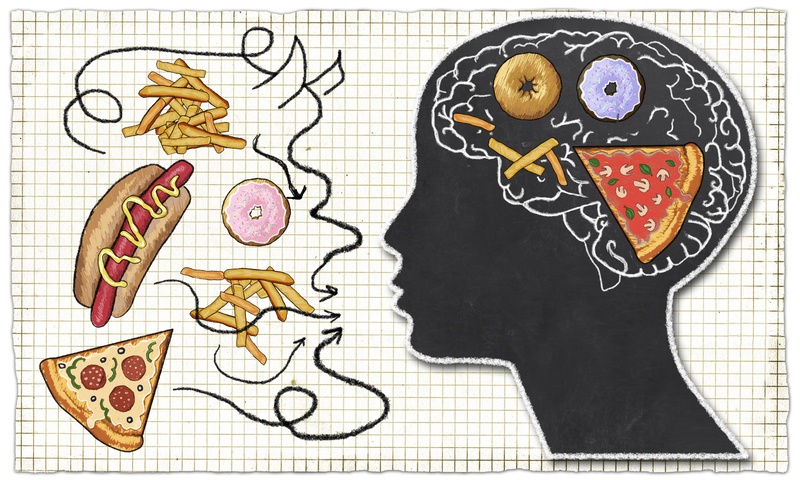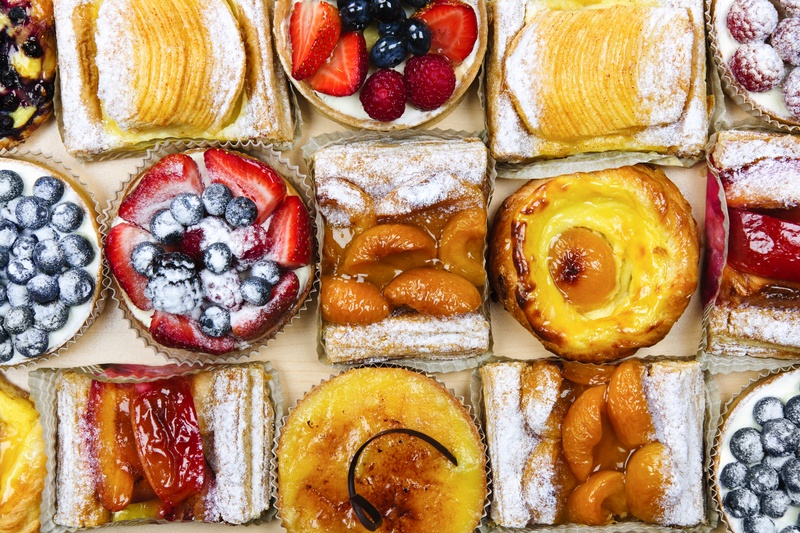Understanding Food Addiction: Symptoms, Causes and Treatment

Overeating is something we can all relate to at some point. Both humans and animals are hardwired to enjoy calorie-rich foods over lower calorie alternatives as a survival mechanism.
However, when food is available to us in abundance, we have to rely on self-regulation and listen to hunger signals to ensure we don’t eat more than we should.
Where Does Lack of Self-Regulation End and Food Addiction Begin?
Food is about more than energy intake, it’s often about emotions. Humans eat for pleasure. We eat to heighten positive emotions and dampen negative ones. We eat to celebrate and socialize, express love, romance and sensuality. For every occasion, there is an opportunity to eat.
Studies have shown that highly-palatable foods, particularly those high in fat, sugar and/or salt, trigger the reward and pleasure areas in the brain that release dopamine. (1) In fact, brain imaging studies have shown that food can affect the same areas of the brain as heroin or cocaine.

Certain people are more predisposed to developing a behavioural addiction than others. For example, those who have unresolved or deeply rooted emotional trauma. Those suffering from an addiction are often experiencing feelings of grief, hopelessness, or emptiness, and seeking out their basic needs, such as security, comfort, and love.
When a person turns to food as a means for feeling comfort or security, the pleasure centers of the brain light up, and so does the need to repeat the experience and eat again, even if you aren’t hungry.
This is where an addictive behaviour pattern comes in. You begin to crave and actively seek out foods that trigger a dopamine response (such as sugar or fast foods). The addiction is more powerful than knowing the detrimental effects that overeating or certain food choices are having on your health and wellbeing.
Overcoming Food Addiction
Food addiction is somewhat unique in how it can be addressed because, although addiction to these high fat, high sugar, highly rewarding foods is so similar to the addiction to drugs, you cannot abstain from eating.
Food will always remain a necessity. Therefore, it’s important to create awareness around exactly how you are using food to manage your emotions. Awareness is the first step in finding other ways to cope.
Here are a few actions you can take to better understand your behavioural patterns, as they relate to food addiction.
1. Prioritize seeking enjoyment through your favorite hobbies and activities.

What activities and hobbies do you absolutely love doing? Experiencing joy through other activities, and even reconnecting with friendships, family members, or healthy relationships are excellent ways to shift your focus from the addictive thoughts and behaviours that are occupying your mind.
Sometimes, the interests and people you have associated with in the past can be anchors to your self-destructive behaviours.
2. Surround yourself with people who support you.
If you feel there are people in your life who are not helping you move forward, it’s encouraged to prioritize your own self-care by creating healthy boundaries and distance— while spending time with people who support you in the changes you’re making. This is where a support group can be incredibly helpful.
3. . Begin an emotional healing journey.

At the root of most addictive behaviour, is emotional trauma or trauma(s), difficult suppressed emotion, and/or a void that is asking to be filled.
A traumatic experience, including physical, emotional or sexual abuse, can alter the structure of your brain. This can increase your chances for experiencing depression, anxiety, PTSD, which can also lead to addiction.
As you begin your emotional healing journey, you will also be healing the root of why addictive behaviours are showing up in the first place. This is key for creating a sustainable recovery and preventing relapse.
Working with a therapist you trust and feel comfortable speaking with is recommended for exploring the past, so that you don’t get overwhelmed and can become clearer on the possible ways you addictive patterns and behaviours emerged.
4. When cravings hit, seek out endorphins through exercise.

All forms of exercise such as yoga, running, strength training, and even taking a walk in nature is the best way to honor your body, and treat it with love and respect.
This is a great way to get a rush of the feel-good chemicals that get released in the brain, and may feel similar to a rush from an addictive behaviour or substance.
In the beginning stages of healing addiction, choosing exercise over your substance of choice will be challenging. However, once you actually get yourself to the class or start doing the exercise, you’ll find yourself in a state of enjoyment and wondering what took you so long to get outdoors, or into the gym or spin class.
This healing journey is about commitment and establishing a regular daily routine. This is a process, so be gentle with yourself. Even ten minutes of walking counts. You have to start somewhere. Most importantly, choose a form of exercise you truly enjoy so that you’re more motivated to stick with it.
Exercise isn’t only good for your body, but it’s great for your mental health. It’s even recommended as one of the top natural treatments for depression and anxiety, because of how effective it is for improving your mood quickly.
When you begin to get a craving, try your best to observe rather than react. Taking three deep breaths can also help the craving pass.
Overcoming Food Addiction is About Emotional Healing and Creating a Fresh Start

Therapy tackles the spiritual, emotional, physical and social elements of the food addiction puzzle, helping patients discover how their lifestyle must change, from self-destructive thought patterns to relationships and influences that need to change or even end altogether.
At the Paradise Valley Healing Center, we offer services and programs to help our guests heal and improve their relationship with food and eating. To learn how we can help you on the path to healing, contact us today for a free consultation. We’re here to take your call whenever you are ready.

